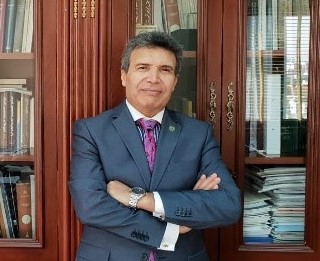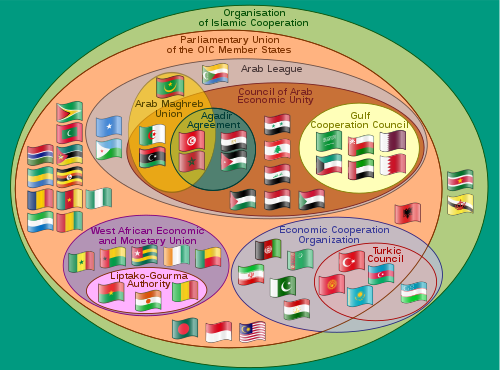International Institute for Middle East and Balkan Studies (IFIMES)[1] from Ljubljana, Slovenia, regularly analyses developments in the Middle East, Balkans and also around the world. Ambassador Ali Goutali,Director at the OIC General Secretariat in Jeddah, KSA, former Tunisian Ambassador to Russia and other countries prepared analysis entitled “Vienna Process of IFIMES: OIC for the future of Euro-Med[2]”. He is writing about theEuro-med space and how more bold efforts and far-sighted actions should be taken to meet all of the challenges and revive the hope sparked by the Oslo Peace Accords, the Barcelona Process, the Euro-Med Partnership and the Union for the Mediterranean.

● Ambasssador Ali Goutali
I would like, first of all, to thank the organizers, particularly Modern Diplomacy and International Institute for Middle-East and Balkan Studies (IFIMES) for inviting me to speak at this important and timely conference, under the theme: “Europe Future Neighbourhood - Disruptions, Recalibration, Continuity”, within the framework of the second leg of Vienna Process, launched to celebrate the 75th anniversary of the United Nations.
Let me at the outset recall briefly few facts about Europe and its neighbourhood. The Euro-med partnership and Barcelona Process conceived in 1995, proceeded from the conviction that durable and sustainable stability and prosperity of Europe will only be guaranteed if the southern shore of the Mediterranean (North Africa and the Middle East) is stable and prosperous.
The Euro- Mediterranean Partnership was conceived against the backdrop and in the wake of Oslo Peace Accords meant to find a two-state solution to the Palestinian Israeli conflict. It is important to recall this fact so as to put the Initiative in its historical and geopolitical proper context.
The Barcelona Declaration states particularly that the initiative of Barcelona Process aims at “turning the Mediterranean basin into an area of dialogue, exchange and cooperation, guaranteeing peace, prosperity and stability”, and this through basically three Baskets:
In 2009 the Euro- Mediterranean Partnership was rechristened as the Union for the Mediterranean (UFM), following the Paris Summit in 2008. This Union aimed at shared ownership, shared decision-making and responsibility between northern and southern shores of the Mediterranean.

This new entity “UFM”, reinforcing Euro-Med Partnership Initiative, revived hopes for fruitful and concrete cooperation. However, though many projects had been identified since the inception of Euro-Med partnership and the creation of UFM, unfortunately just little of the initial ambitions has been so far achieved.
Currently, wars, tensions, instability and chaos continue to engulf some of North African and Middle Eastern countries. 9/11 attacks and its aftermath, an upsurge in terrorism and violence, religious extremism embodied by the so-called Islamic State or Daash, particularly following the so-called Arab Spring, migrant influx; and the stalemate in which the Palestinian-Israeli conflict (one of the main incentives behind the Euro-med Initiative) has been mired in, have contributed to stalling the Euro-med Process.
The ongoing COVID-19 pandemic that ushered in a new age of lethal diseases should be viewed as a new major challenge that constitutes a health basket for Euro-med partnership in addition to the aforementioned baskets.
In fact, the devastating implications of COVID-19 on socio-economic activities due to unpreceded lockdowns and disruptions have heightened awareness of the close link between health and economic development, social welfare and prosperity.
In the past, states were not convinced of the correlation between diseases and national security and social economic well-being. Health issues were not therefore considered as priority on the international affairs agenda and for assistance objectives.
“Global threats like Pandemics cannot be solved with national policies and necessitate collective and planned actions regionally and globally” to paraphrase Minouche Shafik, Director of London School of Economics, LSE.
Developed and wealthy countries including European countries should not overlook the fact that the eradication of global pandemics implies regional and global inclusive strategies that do not exclude a single country. The non-eradication of a pandemic, which does not respect borders in one country or a region, would lead to the spread of the disease beyond its borders and to socio-economic fallout among countries left behind that would ultimately trigger unrest, threating regional and global security and stability. “No monopolies or restrictions or selfishness should be allowed in times of lethal pandemics and global threats to human existence”, to quote in substance Ross Taylor from LSE.
The COVID-19 pandemic has taught us few lessons among which prioritization of health above all, and that regional and global safety, prosperity and security in a globalized world imply that no one should be left behind, deep transformation should occur putting more focus on innovation, technology and knowledge exchange.
We have also learnt from this health crisis that cooperation and solidarity among the developed and less developed, the Haves and the Have-nots, should be the guiding principle regionally and globally. “When the crisis comes, we will wish we had more funding and more global cooperation, but then it will be too late”, to quote in substance journalist and geopolitics expert, Fareed Zakaria.
In closing, it is obvious that global change in the context of globalization had created challenges including climate change, population migration, economic and financial crisis, terrorism …but, under the current COVID-19 circumstances, a new era of lethal pandemics is being heralded. Old and new challenges need coordinated policies, cooperation and solidarity, regionally and globally, for the common benefit of the Euro-med region, our planet and the entire humanity.
In the Euro-med space, more bold efforts and far-sighted actions should be taken to meet all of these challenges and revive the hope sparked by the Oslo Peace Accords, the Barcelona Process, the Euro-Med Partnership and the Union for the Mediterranean.
The European Union ought to play to this end an active and diligent role to:
About the author:
Ambassador Ali Goutali, Tunisian top diplomat, serving numerous key posts on four continents, former Head of the national diplomatic institute. Author of several publications including a book on decision making in foreign policy. Current Director at the OIC General Secretariat in Jeddah, KSA.
The views expressed in this article are the author’s own and do not necessarily reflect IFIMES official position.
Ljubljana/Vienna/Jeddah,14 March 2020
Footnotes:
[1] IFIMES – International Institute for Middle East and Balkan Studies, based in Ljubljana, Slovenia, has Special Consultative status at ECOSOC/UN, New York, since 2018.
[2] Delivered at the 2nd Vienna Process International Conference (Panel I: Revisiting and Rethinking Euro-Med), Diplomatic Academy Vienna, Austria - 8th March 2021.